Yangon Days
I recreate my travel journals here, recording all the silly stream-of-consciousness writing I was doing while on the field. I'm dating it chronologically, and may include pictures as and when I feel they're relevant. Hope you like it.
--------------------------------------------------------------------------------------------
Yangon, 9 DECEMBER 2006, 5.15pm ( the day we landed )
It isn't 2006.
Seems more like 1964. In a place that's between Old Delhi of today and Kuala Lumpur circa 50 years ago.
Yangon streets may not be as dusty as any Indian city's, nor as arid, but there is definitely a sense of stymy and decay about the place.
Shop signs are like matchboxes, and I've yet to see a flood of neon - the occasional one signifies an upper crust joint. Cars are aplenty but ancient, drilling out its engines and gasping out deadly fumes. Five-footways are alive with makeshift markets, laying down everything from roasted meat to fruit to pirated movies to toy mobiles right on the grimy gray footpath, saved from a kick from a passer-by only through thin blankets and blinding smiles.
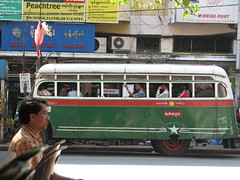
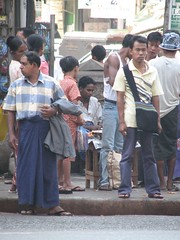
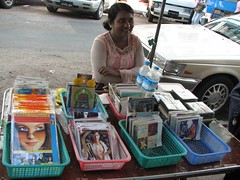
A great difference that reminds me that we're in a foreign country - the lungyis of the men ( the cutest thing ever ) and mushrooming pagodas ( or payas ) at any given point in the landscape.
The Burmese script is another fascinating thing. To me, it seems a mix of Telegu/Malayalam, with a sprinkling of Sanskrit. Interestingly, there's nothing remotely Thai about it, which I'm certain is due to the fact that the Thai script is man-made, by one of its kings in the last century.
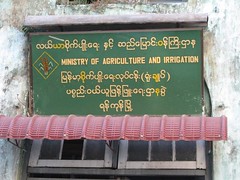
After the initial shock at the antiquated environment, though, you can't help but start looking at the people - contrary to what I expected, the Bamar ( the largest ethnic group in Yangon ) remain gentle, unassuming, mild-mannered, always ready with a smile and an easy laugh. They very much remind me of the kampung Malays - the kind that has almost disappeared between the cracks of KL's mind-numbing skyscrapers.
They seem easily content - a two-sided coin, perhaps, since that may only be a hop,skip and jump towards complacency - again, a trait the Indians and Chinese in Malaysia associate with the Malays. As Mr Tan, our only local contact ( and still a stranger ) here mentions, the economy is in the hands of the Chinese and the Indian Muslims - neither of whom, I can surmise, would be much interested in the political situation of the country, as long as it doesn't threaten their livelihood. Its the sad apathy that every ethnic minority disapora wears like clothes - essential for survival.
There is another, more important difference between the Burmese and the Malays, though - the Burmese love to read. Really. It was quite a surprise for me, despite the various warnings in my Lonely Planet guide ( henceforth known as my 'good book' ). Literacy levels are high, and bookstalls abound, selling mostly Burmese books.
And another thing - the electricity goes off quite a few times a day, as it just has right now at Bharat Restaurant, 5.45 pm. Good places keep generators to get the energy back up.
Mother's made contact with the workers of Bharath Restaurant where we've had lunch. The food was atrocious, but I picked up that the waiters were speaking Tamil, and Mother's hooked up with them and found out all about the temples etc.
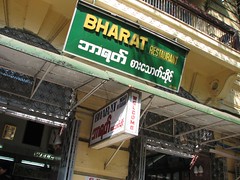
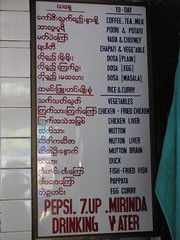
There seems to be a pocket of Indian-ness to Yangon that everyone seems to know about - even Mr Tan, who had no idea where Bharath Restaurant is, found it in no time due to local help - who knew the name while Mr Tan didn't, and kept saying "Namaskaaram", which tickled Mother no end.
There is still the occasional beggar, and purchase of a street product brought an old Indian beggar woman to me. Looking into those hope-forsaken eyes, it would've been inhuman of me to desist. I don't even know how much I gave her. But I did turn away from a cry from another quarter subsequently.
--------------------------------------------------------------------------------------------
Yangon, 9 DECEMBER 2006, 5.15pm ( the day we landed )
It isn't 2006.
Seems more like 1964. In a place that's between Old Delhi of today and Kuala Lumpur circa 50 years ago.
Yangon streets may not be as dusty as any Indian city's, nor as arid, but there is definitely a sense of stymy and decay about the place.
Shop signs are like matchboxes, and I've yet to see a flood of neon - the occasional one signifies an upper crust joint. Cars are aplenty but ancient, drilling out its engines and gasping out deadly fumes. Five-footways are alive with makeshift markets, laying down everything from roasted meat to fruit to pirated movies to toy mobiles right on the grimy gray footpath, saved from a kick from a passer-by only through thin blankets and blinding smiles.



A great difference that reminds me that we're in a foreign country - the lungyis of the men ( the cutest thing ever ) and mushrooming pagodas ( or payas ) at any given point in the landscape.
The Burmese script is another fascinating thing. To me, it seems a mix of Telegu/Malayalam, with a sprinkling of Sanskrit. Interestingly, there's nothing remotely Thai about it, which I'm certain is due to the fact that the Thai script is man-made, by one of its kings in the last century.

After the initial shock at the antiquated environment, though, you can't help but start looking at the people - contrary to what I expected, the Bamar ( the largest ethnic group in Yangon ) remain gentle, unassuming, mild-mannered, always ready with a smile and an easy laugh. They very much remind me of the kampung Malays - the kind that has almost disappeared between the cracks of KL's mind-numbing skyscrapers.
They seem easily content - a two-sided coin, perhaps, since that may only be a hop,skip and jump towards complacency - again, a trait the Indians and Chinese in Malaysia associate with the Malays. As Mr Tan, our only local contact ( and still a stranger ) here mentions, the economy is in the hands of the Chinese and the Indian Muslims - neither of whom, I can surmise, would be much interested in the political situation of the country, as long as it doesn't threaten their livelihood. Its the sad apathy that every ethnic minority disapora wears like clothes - essential for survival.
There is another, more important difference between the Burmese and the Malays, though - the Burmese love to read. Really. It was quite a surprise for me, despite the various warnings in my Lonely Planet guide ( henceforth known as my 'good book' ). Literacy levels are high, and bookstalls abound, selling mostly Burmese books.
And another thing - the electricity goes off quite a few times a day, as it just has right now at Bharat Restaurant, 5.45 pm. Good places keep generators to get the energy back up.
Mother's made contact with the workers of Bharath Restaurant where we've had lunch. The food was atrocious, but I picked up that the waiters were speaking Tamil, and Mother's hooked up with them and found out all about the temples etc.


There seems to be a pocket of Indian-ness to Yangon that everyone seems to know about - even Mr Tan, who had no idea where Bharath Restaurant is, found it in no time due to local help - who knew the name while Mr Tan didn't, and kept saying "Namaskaaram", which tickled Mother no end.
There is still the occasional beggar, and purchase of a street product brought an old Indian beggar woman to me. Looking into those hope-forsaken eyes, it would've been inhuman of me to desist. I don't even know how much I gave her. But I did turn away from a cry from another quarter subsequently.


0 Comments:
Post a Comment
<< Home